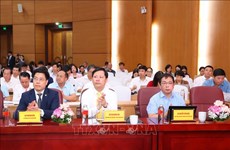Experts forecast M&A surge in property sector
After a minor upswing in the first half of the year, mergers and
acquisitions (M&A) in Vietnam’s real estate market are expected to
further take off in the coming time, the Vietnam Investment Review (VIR)
cited experts as saying.
After a minor upswing in the first half of the year, mergers and
acquisitions (M&A) in Vietnam’s real estate market are expected to
further take off in the coming time, the Vietnam Investment Review (VIR)
cited experts as saying.
Statistics from the Ministry of Planning and Investment showed that the country attracted 5.7 billion USD in disbursed foreign direct investment (FDI) in the first half of the year, a 1 percent increase on-year.
FDI into the property sector accounted for around 10 percent of the total, mainly via M&As, it noted.
Several M&As have been reported recently, such as the Movenpick Saigon Hotel, Pico Plaza, the Bay Water project, and Alma Resort.
As well as foreign-invested M&As, local transactions have also been more widely reported.
According to Su Ngoc Khuong, associated director of investment at Savills Vietnam, the reviving property market and improved liquidity is a result of the government’s efforts to stimulate the real estate sector.
“Also, some property developers have been eager to sell their projects to ease financial burdens, while financially strong enterprises are looking to acquire projects to take advantage of the improving market,” the VIR quoted Khuongas saying.
As a result, several M&A deals have been closed. The gradual completion of infrastructure and roads in major metropolitan areas and satellite cities has also made the property sector more attractive.
Real estate M&A in Vietnam is expected to continue its uptrend, given that Vietnam is still one of the most promising growth markets.
Another factor is the pending Trans Pacific Partnership Agreement (TPP), which would support the growth of the national economy and increase FDI inflows to Vietnam.
Khuong added that the market has continued to see residential development projects changing hands, and not only apartment, but also landed property and township projects.
“Investors have a big appetite for operating assets with stable yields and lower risks. Within the hotel sector, fast rising tourist numbers, both domestic and international, are the rationale behind investment in urban hotel projects and also resorts. This is further supported by the rapid growth in the number of direct international flights to multiple provincial airports,” Khuong explained.
Interest from Japanese and Korean investors, who have accounted for the majority of M&A activities over the last two years, is expected to stay strong.
There is also growing demand from Singaporean and Taiwanese groups for both residential and commercial office buildings. There is likely to be continued activity in these products over the coming months and into next year.
At the latest conference on M&A activities in Vietnam, recently organised by VIR, experts predicted that there will be a “second wave” of M&A in Vietnam over the next five years, when the economy recovers and foreign direct investment surges.
Foreign experts at the event forecasted that by that time the country may see 20 billion USD in M&A transactions.
Apart from the TPP, free trade agreements with the EU and the Republic of Korea, and an FTA with the Russia, Belarus and Kazakhstan customs alliance are expected to be signed by next year, which will also see the beginning of the ASEAN Economic Community.
According to Deputy Minister of Planning and Investment Nguyen Van Hieu, there is a strong growth in the number of M&As in Vietnam, with the total value of deals reaching 5 billion USD last year, compared to a mere 1 billion USD five years ago.-VNA
Statistics from the Ministry of Planning and Investment showed that the country attracted 5.7 billion USD in disbursed foreign direct investment (FDI) in the first half of the year, a 1 percent increase on-year.
FDI into the property sector accounted for around 10 percent of the total, mainly via M&As, it noted.
Several M&As have been reported recently, such as the Movenpick Saigon Hotel, Pico Plaza, the Bay Water project, and Alma Resort.
As well as foreign-invested M&As, local transactions have also been more widely reported.
According to Su Ngoc Khuong, associated director of investment at Savills Vietnam, the reviving property market and improved liquidity is a result of the government’s efforts to stimulate the real estate sector.
“Also, some property developers have been eager to sell their projects to ease financial burdens, while financially strong enterprises are looking to acquire projects to take advantage of the improving market,” the VIR quoted Khuongas saying.
As a result, several M&A deals have been closed. The gradual completion of infrastructure and roads in major metropolitan areas and satellite cities has also made the property sector more attractive.
Real estate M&A in Vietnam is expected to continue its uptrend, given that Vietnam is still one of the most promising growth markets.
Another factor is the pending Trans Pacific Partnership Agreement (TPP), which would support the growth of the national economy and increase FDI inflows to Vietnam.
Khuong added that the market has continued to see residential development projects changing hands, and not only apartment, but also landed property and township projects.
“Investors have a big appetite for operating assets with stable yields and lower risks. Within the hotel sector, fast rising tourist numbers, both domestic and international, are the rationale behind investment in urban hotel projects and also resorts. This is further supported by the rapid growth in the number of direct international flights to multiple provincial airports,” Khuong explained.
Interest from Japanese and Korean investors, who have accounted for the majority of M&A activities over the last two years, is expected to stay strong.
There is also growing demand from Singaporean and Taiwanese groups for both residential and commercial office buildings. There is likely to be continued activity in these products over the coming months and into next year.
At the latest conference on M&A activities in Vietnam, recently organised by VIR, experts predicted that there will be a “second wave” of M&A in Vietnam over the next five years, when the economy recovers and foreign direct investment surges.
Foreign experts at the event forecasted that by that time the country may see 20 billion USD in M&A transactions.
Apart from the TPP, free trade agreements with the EU and the Republic of Korea, and an FTA with the Russia, Belarus and Kazakhstan customs alliance are expected to be signed by next year, which will also see the beginning of the ASEAN Economic Community.
According to Deputy Minister of Planning and Investment Nguyen Van Hieu, there is a strong growth in the number of M&As in Vietnam, with the total value of deals reaching 5 billion USD last year, compared to a mere 1 billion USD five years ago.-VNA













